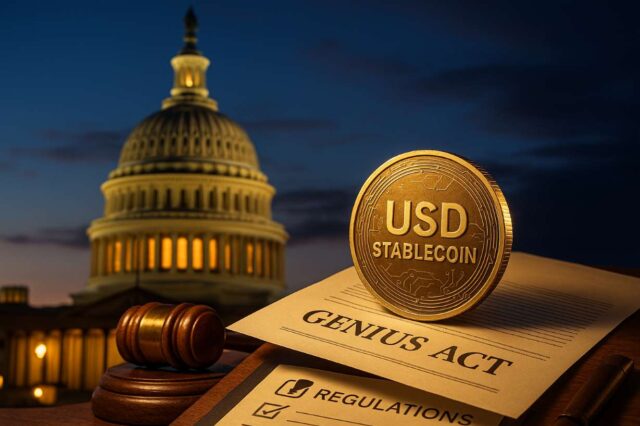In a landmark move for the digital asset industry, the U.S. Senate has passed the GENIUS Act, setting the stage for the country’s first federal framework for stablecoin regulation. This U.S. Senate crypto bill is a defining moment in stablecoin legislation in 2025, offering legal clarity for issuers. However, its passage also highlights concerns about political influence and crypto lobbying.
As the bill moves to the House of Representatives, lawmakers and industry figures remain split. Some hail the move as a breakthrough; others warn of imbalances behind the scenes.
What the GENIUS Act Does
The GENIUS Act stablecoin legislation introduces a two-tier licensing system. Stablecoin issuers can register through state-based regimes under Federal Reserve stablecoin supervision, or seek a federal license from the Office of the Comptroller of the Currency (OCC). Some analysts call this a modern approach to OCC stablecoin licensing.
Issuers must maintain 100% reserve backing, undergo regular audits, and follow enhanced consumer disclosure rules. These safeguards aim to avoid past crypto collapses and form a stablecoin oversight framework built for the U.S. market.
Industry Sees a Win, But Critics Remain Vocal
Crypto leaders say the act legitimizes stablecoins. It offers a structured path forward, with flexibility to support innovation. Many view the dual-path model as a win for market diversity.
Still, critics say smaller firms may be pushed out by compliance costs. Progressive lawmakers argue the bill helps large players more than consumers. “We need bipartisan crypto regulation that protects the public, not just venture capital portfolios,” said one House Democrat.
Corruption and Crypto Lobbying Concerns Surface
Beyond the bill’s text, critics highlight the role of crypto lobbying in Congress. Reports cite aggressive outreach from stablecoin issuers and crypto-funded PACs. These efforts intensified just before the final draft.
Republican Senator Tim Scott’s GENIUS Act leadership won bipartisan praise. However, some colleagues say the process lacked transparency. Critics argue that lawmakers had little time to study the risks or hold hearings.
Systemic Risk or Regulatory Clarity?
Supporters say the bill adds needed protections. It divides regulatory power between state and federal bodies. However, some warn that split authority could allow gaps to form.
Without coordination, federal stablecoin regulation may remain fragmented. “The framework is a good start, but we’ll need stronger safeguards if we’re serious about long-term market stability,” said one analyst.
House Vote On GENIUS Act Could Face Resistance
The bill now heads to the House, where opposition may be stronger. Some lawmakers want more robust consumer protections and tighter rules on lobbying. The House vote on the GENIUS Act may test how far crypto laws can go in a divided Congress.
Whatever happens next, the Senate’s vote has changed the landscape. Stablecoins are now a national policy issue.
>>> Read more: Genius Act: Bipartisan Efforts on Stablecoin Regulation
The GENIUS Act’s stablecoin regulation marks a turning point for U.S. digital asset policy. However, it also shows the political forces that shape financial regulation. Whether praised as visionary or criticized as compromised, the bill moves the U.S. toward a regulated stablecoin market and sets the tone for what comes next in crypto law.
Readers’ frequently asked questions
Does the GENIUS Act apply to algorithmic stablecoins?
No. The GENIUS Act focuses exclusively on fiat-backed stablecoins that are fully backed by reserve assets. Algorithmic stablecoins, which rely on code-based supply mechanisms instead of collateral, are not eligible for licensing under the act.
Can foreign companies issue stablecoins under the regulations of the GENIUS Act?
Only U.S.-domiciled entities can apply for a stablecoin license under the GENIUS Act. Foreign issuers would need to establish a U.S. legal presence and meet the same reserve, audit, and licensing requirements to operate lawfully in the U.S. market.
What happens if a state and the federal regulator have conflicting rules?
The GENIUS Act does not explicitly resolve conflicts between state-chartered rules and federal oversight by the Federal Reserve. Experts expect that further guidance or companion regulations will be necessary to address inter-agency coordination and preemption issues.
Will unlicensed or foreign-issued stablecoins still be accessible to U.S. users?
The short answer is no. Once the GENIUS Act becomes law, only stablecoins issued by licensed entities will be permitted in the U.S. market. Exchanges and payment platforms serving U.S. users will be expected to delist or block access to non-compliant stablecoins, including those issued offshore.
Can algorithmic stablecoins still be traded legally in the U.S.?
Not under the GENIUS Act. While the law does not outright ban them, it offers no regulatory pathway for algorithmic stablecoins. As a result, U.S. exchanges may delist them to minimize legal risk. Other regulators, like the SEC or CFTC, may take separate enforcement action depending on their classification.
What Is In It For You? Action items you might want to consider
Monitor the House debate and potential amendments to the GENIUS Act
If you’re a stablecoin issuer, legal advisor, or investor, follow the House discussion closely. Changes to consumer protection, licensing conditions, or reserve mandates could significantly alter compliance strategies.
Re-evaluate your regulatory pathway for stablecoin issuance
With both state and federal licensing options under the GENIUS Act, fintech firms should reassess which route aligns better with their business model, capital structure, and risk appetite.
Stay alert to rising scrutiny of crypto lobbying and influence
Advocacy efforts will likely intensify as the bill progresses. Firms engaged in lobbying or political engagement should prepare for increased public and regulatory attention.











[…] >>> Read more: GENIUS Act Clears Senate, Reshaping U.S. Stablecoin Regulation […]